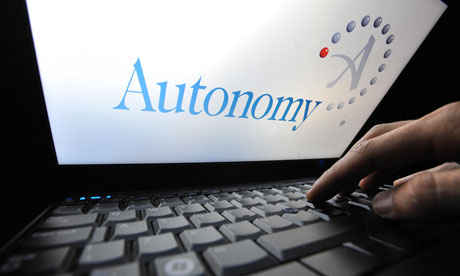
A simmering row over how easy it is for British companies to be acquired by foreign competitors exploded into the open on Friday following US multinational Hewlett-Packard's £6.7bn swoop for Autonomy, Britain's largest software company.
Last year, there was uproar when the American group Kraft acquired Cadbury after a lengthy bid battle, and later reneged on a promise to keep open a factory near Bristol, a move that led to 500 British job losses. Kraft's hostile bid attracted criticism from former trade minister Lord Mandelson amid allegations that Britain was a soft touch for overseas predators.
HP's agreed takeover of Autonomy has prompted warnings about the UK losing another market leader to an overseas buyer. Tony Burke, Unite's assistant general secretary for manufacturing, said: "It would be a dreadful shame if this acquisition followed form – job losses, investment drain and, worst of all, new technologies and skills ebbing out of our economy.
"Vince Cable (the business secretary) must surely be regretting dragging his heels on his promised Cadbury law," – which would make it more difficult for foreign takeovers to succeed.
Burke claimed the problem with merger and acquisitions is that they do not grow the economy and rarely create jobs. He said: "We felt so strongly about the takeover of Cadbury because it took a successful UK-based company, saddled it with horrendous debt, closed a factory and created employment and investment uncertainty."
John Denham, shadow business secretary, said there might be a case for looking at whether certain strategic industries should be protected from foreign takeover, although it was more difficult where mergers were agreed, as with the HP and Autonomy transaction.
He said: "The question we should be asking is why technology companies (such as Autonomy) seem incapable of growing any bigger before they are taken out by an overseas acquirer." Denham criticised financial backers of technology start-ups who insist on a sale of the business at a certain point so they can recoup their investment.
On the more general point of foreign takeovers, he said: "When the centre of gravity moves elsewhere, it will always be tempting to scale back a British subsidiary when times are hard."
The takeover of Autonomy could prove embarrassing to ministers, who have stressed the importance of developing UK hi-tech companies that can compete on the international stage.
Britain's vulnerability to cutbacks by foreign companies was highlighted in February when the US drug company Pfizer said it would close an R&D centre in Kent with the loss of up to 2,400 jobs to save $5bn (£3bn) a year.
In the City, shares in Autonomy soared 72% to £24.67 following news of the takeover, but in New York, HP's stock price fell by as much as 20% as investors balked at the 80% premium the US firm was paying. American shareholders also expressed alarm about a more difficult trading outlook for HP, which is based in Palo Alto, California.
Autonomy was co-founded in Cambridge in 1996 by Mike Lynch, who remains in control as chief executive. Lynch has criticised London analysts, complaining that a lack of understanding of the software business has left Autonomy's shares undervalued.
Lynch, whose 8% stake in the company means that he could pocket $800m, has assured staff in Cambridge that "everyone is staying" and that the deal will allow the firm to expand its global reach. Autonomy specialises in pattern recognition technologies.
Cambridge MP, Julian Huppert, Liberal Democrat, said the merger "showed what a prized asset Autonomy had become".

